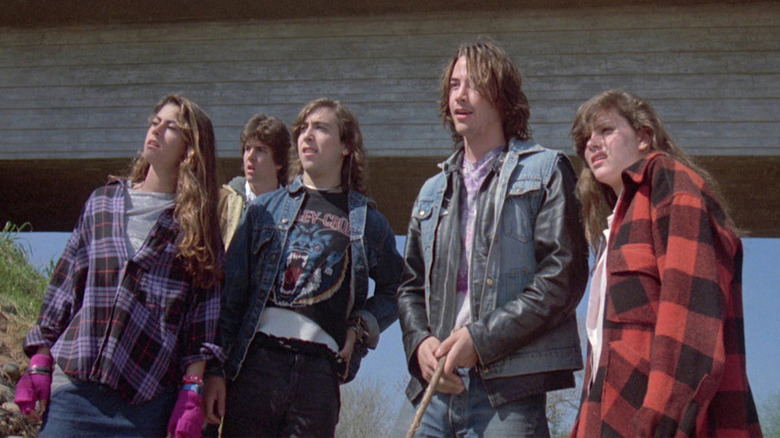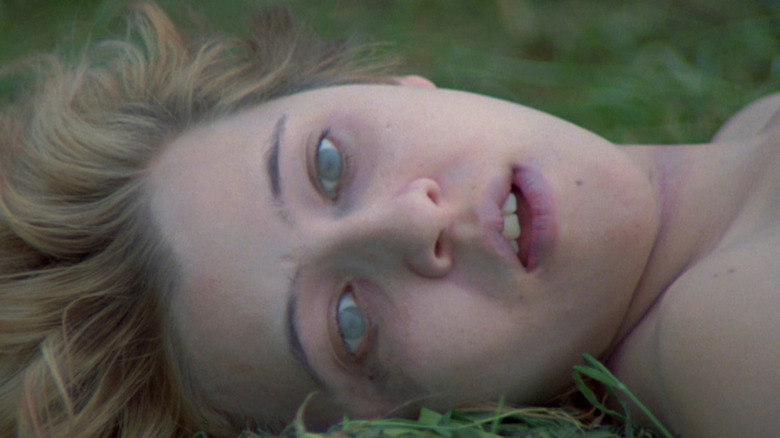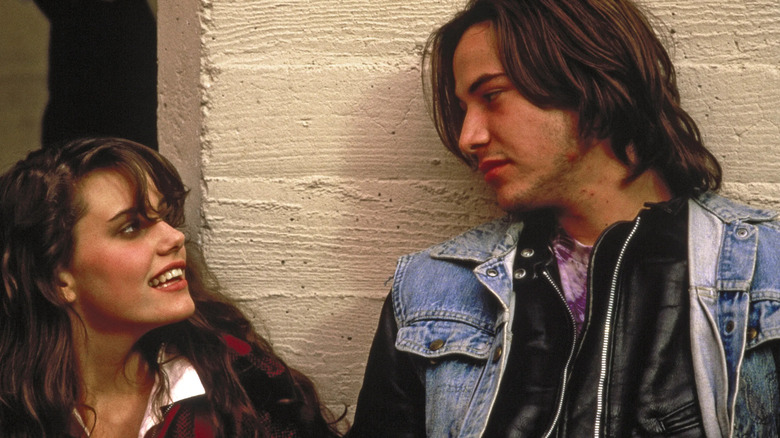The Murderous True Story Behind 1986 Movie River's Edge
"River's Edge" was one of the most important independent films of the 1980s. Directed by Tim Hunter from a screenplay by Neil Jimenez, it tells the soul-deadening story of a group of teens who cover for their friend after he murders another of their friends. What makes the movie especially disturbing is the teens' indifference; when they're taken to view the nude corpse, which the killer has dumped at the title location, most of them gaze at it with a galling lack of emotion.
"River's Edge" earned raves from critics and won Best Picture at the 1988 Independent Spirit Awards. It launched the careers of Keanu Reeves, Ione Skye, and Daniel Roebuck, and went a long way toward spurring Dennis Hopper's late '80s comeback. It is a scathing experience, one that leaves such an indelible mark you need not revisit it. You'll never shake the image of Danyi Deats's strangely serene expression as the deceased and discarded Jamie. It's also tough to account for the teens' apathy. There are clues as to what screwed some of them up (particularly Reeves' semi-principled Matt), but they're generally broken before the movie begins.
Jimenez's script ends with something approaching a catharsis, but it's really an objective presentation of kids who, for one reason or another, believe life is cheap and meaningless. This is horrifying in and of itself, but it's downright bloodcurdling when you realize it's based on an actual incident.
An unvarnished examination of emotional detachment
In 1981, 17-year-old Anthony Jacques Broussard strangled 14-year-old Marcy Conrad to death and jettisoned her body in the foothills of Milpitas, California. The murder shook up the Silicon Valley city, and made enough national noise to catch the attention of Jimenez, a native of the area who was studying film at UCLA. As Jimenez told Vice in a 2017 oral history of the movie:
"There was a news story about a kid who dumped a body and took his friends to see it. I was in a screenplay class at UCLA, and I wrote it for the class. Most of the characters were based on people I had gone to high school with. I thought it spoke to a mood that young people were feeling at the time — feeling detached from things and wanting to zone out."
"River's Edge" is bleak, but had Jimenez attempted a wholly faithful retelling of this awful saga, he would've wound up with something like "Henry: Portrait of a Serial Killer as a Young Man." Two things the film gets right are Broussard's physical bearing and emotional vacancy; according to expert psychological testimony in his 1982 trial, he was an intimidatingly big kid devoid of feeling for other human beings. The defense tried to draw sympathy from the jury by calling psychiatrist Dr. Samuel G. Benson Jr. to the stand, who posited that Broussard's mental development had been halted by the death of his mother when he was eight years old. Benson ultimately concluded that Broussard was "a chronic paranoid schizophrenic with transient organic brain disease caused by drug abuse."
Given that he was a minor at the time of the murder, Broussard could not be sentenced to death, so the judge hit him with 25 years to life.
"River's Edge" might be fictionalized, but Hunter and Jimenez were determined to capture the conspiratorial amorality that led Broussard's friends to cover for him. Did they succeed? It depends on who you ask.
'That's what those kids were like'
Glenn F. Bunting, the San Jose Mercury News reporter who broke the story in 1981 (and interviewed many peripheral players in the sordid episode), thought the film was too much of a wallow. He was hoping for a deeper study of the societal conditions that warped these kids' consciences, and objected to the invention of characters like Hopper's drug-dealing weirdo Feck and Matt's nascent psychotic little brother Tim (Joshua John Miller). For him, the film worked best when it dealt with the vileness of Crispin Glover's Layne, and the dawning decency of Reeves' Matt and Skye's Clarissa. That said, in a piece he wrote for the Los Angeles Times in 1987, Bunting came off as a fusty scold when he concluded:
"There's much to learn from Marcy Conrad's death — the combination of drugs, TV violence, deafening rock music, arcade games and, most of all, neglectful parents have anesthetized our children."
Hunter found that some members of the Milpitas community disagreed with Bunting's assessment. As he told Vice:
"The screening I remember most before the film opened was in San Jose, near Milpitas, where the actual murder had taken place. A lot of the audience was up in arms, saying, 'Why are you raking us over the coals again? Why are you bringing this all back? We've had enough notoriety with this murder case.' But the principal of the local high school and people from the police department came up to us afterward and said that we'd really gotten it right — that's what those kids were like."
Worrying about the desensitization of kids is an evergreen freak-out in American life, and maybe it's warranted on occasion. I'll take it as a positive that just about everyone who watches "River's Edge" walks away despairing. That we can't understand these characters' actions is only a good thing.
That Broussard was paroled last April is also a thing.


